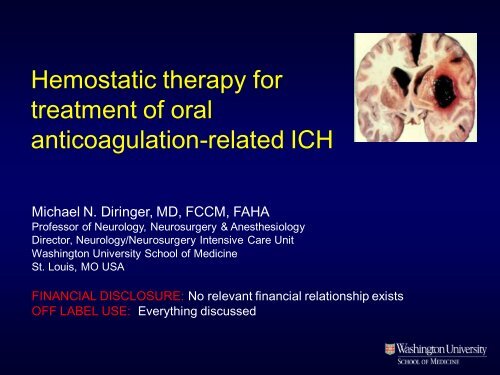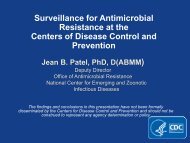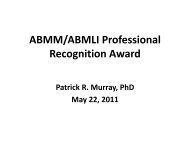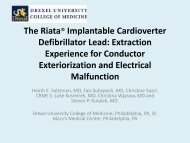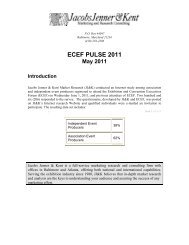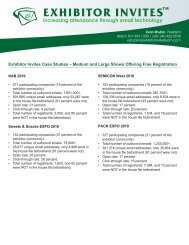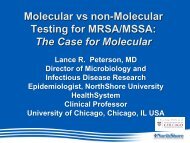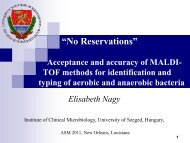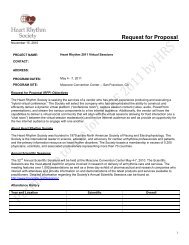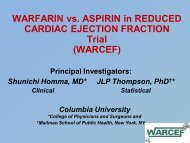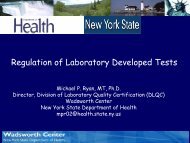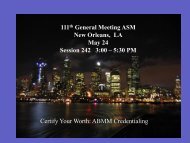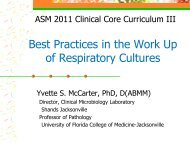Hemostatic therapy for treatment of oral anticoagulation-related ICH
Hemostatic therapy for treatment of oral anticoagulation-related ICH
Hemostatic therapy for treatment of oral anticoagulation-related ICH
Create successful ePaper yourself
Turn your PDF publications into a flip-book with our unique Google optimized e-Paper software.
<strong>Hemostatic</strong> <strong>therapy</strong> <strong>for</strong><br />
<strong>treatment</strong> <strong>of</strong> <strong>oral</strong><br />
<strong>anticoagulation</strong>-<strong>related</strong> <strong>ICH</strong><br />
Michael N. Diringer, MD, FCCM, FAHA<br />
Pr<strong>of</strong>essor <strong>of</strong> Neurology, Neurosurgery & Anesthesiology<br />
Director, Neurology/Neurosurgery Intensive Care Unit<br />
Washington University School <strong>of</strong> Medicine<br />
St. Louis, MO USA<br />
FINANCIAL DISCLOSURE: No relevant financial relationship exists<br />
OFF LABEL USE: Everything discussed
Case<br />
• 65 year old woman with a prosthetic<br />
aortic valve taking warfarin<br />
• Presents within 2 hours <strong>of</strong> onset <strong>of</strong> a<br />
spontaneous lobar intracerebral<br />
hemorrhage<br />
• INR is 2.3 and <strong>ICH</strong> volume is 25 cc
The Controversy<br />
Should PCC or rFVIIa be used <strong>for</strong><br />
acute <strong>treatment</strong> <strong>of</strong><br />
<strong>anticoagulation</strong>-<strong>related</strong> <strong>ICH</strong> ?
OAC <strong>related</strong> intracerebral<br />
hemorrhage
Larger size predicts worse<br />
outcome<br />
Zubkov AY, Arch Neurol 2008;65:1320
Expansion more common with longer<br />
time window<br />
• Hematoma expansion in 28% OAC-<strong>ICH</strong><br />
patients admitted within 24 hours despite<br />
<strong>treatment</strong><br />
Yasaka M, Thromb Haemost. 2003;89:278 –283<br />
• Hematoma expansion up to day 7<br />
Hematoma<br />
expansion<br />
No anticoagulants 16%<br />
On anticoagulants 54%<br />
Flibotte JJ, Neurology, 2004;63:1059
Goal: Rapid correction <strong>of</strong><br />
warfarin induced coagulopathy
Choices<br />
• Vitamin K<br />
• Recombinant activated Factor VII (rFVIIa)<br />
• Fresh Frozen Plasma (FFP)<br />
• Prothrombin Complex Concentrate (PCC)
Vitamin K<br />
• Takes hours to days to achieve an<br />
effective response<br />
• Still necessary when using rFVIIa, FFP<br />
or PCC<br />
• More rapid when given intravenously<br />
– Adverse events: 3 per 10,000
Fresh Frozen Plasma (FFP)<br />
• Contains all coagulation factors<br />
• Takes time:<br />
• Requires compatibility testing and<br />
thawing<br />
• Large volume to infuse<br />
• Median 30 hours until INR<br />
≤1.3<br />
Brody DL, Neurocrit Care. 2005;2(3):263-7
Transfusion <strong>related</strong> acute lung injury<br />
(TRALI)<br />
• Hypoxia and bilateral<br />
pulmonary edema<br />
• Independent predictor <strong>of</strong><br />
mortality<br />
• FFP higher risk than other<br />
blood products<br />
Toy P, Blood. 2011 Nov 23. [Epub],<br />
Triulzi DJ, Anesth Analg 2009 108; 770
Other risks <strong>of</strong> FFP<br />
• Circulatory overload<br />
• Blood-borne infection<br />
– HIV, HCV, HBV<br />
• Allergic reactions
Recombinant activated Factor VII<br />
• 5µg/kg (1 mg <strong>for</strong> 100 kg patient) corrects<br />
therapeutic INR in minutes<br />
But-<br />
• Replaces only 1 factor – may not correct<br />
coagulopathy<br />
• rFVIIa interferes with INR assay<br />
– INR no longer reflects bleeding tendency<br />
– No way to monitor need <strong>for</strong> additional<br />
<strong>treatment</strong>
FVIIa normalizes INR but not bleeding<br />
from punch biopsy<br />
Group n Baseline<br />
After<br />
warfarin<br />
After drug<br />
Placebo 24 1.0 ± 0.1 2.5 ± 0.3 2.5 ± 0.3<br />
5 μg/kg rFVIIa 6 1.1 ± 0.1 2.7 ± 0.3 1.5 ± 0.5<br />
10 μg/kg rFVIIa 6 1.1 ± 0.1 2.6 ± 0.2 1.3 ± 0.1<br />
Skolnick B E et al. Blood 2010;116:693-701
FVIIa normalizes INR but not bleeding<br />
from punch biopsy<br />
placebo<br />
Baseline Coumadin rFVIIa<br />
Skolnick B E et al. Blood 2010;116:693-701
Prothrombin complex<br />
concentrates (PCC)<br />
• Contain prothrombin and factors IX, X,<br />
and usually VII<br />
• Some contain protein C and S<br />
• Immediately available<br />
• Reconstituted in small volume <strong>of</strong> fluid<br />
• ? Potential to induce thrombosis
Literature review: PCC <strong>for</strong> warfarin<br />
reversal<br />
• 14 studies (460 patients) who received<br />
PCC <strong>for</strong> warfarin reversal<br />
• PCCs correct INR faster than FFP<br />
• Seven (1.5%) thrombotic complications<br />
• 3 strokes (occurred >48 hours after<br />
PCC)<br />
• 2 DVTs<br />
• 2 non-Q wave MIs<br />
Leissinger C, Am J Hematol 83:137–143, 2008
Literature review: PCC thrombogenicity<br />
• Conclusions<br />
– With the inclusion <strong>of</strong> coagulation<br />
inhibitors and other manufacturing<br />
improvements, today's PCCs may be<br />
considered safer than earlier products<br />
– PCCs may be considered preferable<br />
to fresh frozen plasma <strong>for</strong> emergency<br />
anticoagulant reversal<br />
Sørensen B, Crit Care. 2011; 15(1): 201
FFP vs. PCC in OAC-<strong>related</strong> <strong>ICH</strong><br />
• Retrospective<br />
• 55 patients with <strong>ICH</strong> while on OAC<br />
• Hematoma growth in 27% within 24 hours<br />
• Hematoma growth less with PCC<br />
• Difference no longer seen if INR<br />
completely reversed within 2 hours<br />
Huttner HB, Stroke. 2006 Jun;37(6):1465-70
PCC in OAC-<strong>related</strong> <strong>ICH</strong><br />
• Prospective<br />
• 92 acute <strong>ICH</strong> patients on warfarin with INR ≥ 2.0<br />
• Treated with PCC (Protromplex, no FVII) and<br />
vitamin K<br />
• No thrombotic<br />
complications<br />
Imberti A et al. Pathophysiol Haemost Thromb 2007–08;36:259–265
Survey <strong>of</strong> practice<br />
• Treat a hypothetical case <strong>of</strong> OAC<strong>related</strong><br />
hemorrhage<br />
• Option to give vitamin K, FFP,<br />
rFVIIa, PCC or combination<br />
PCC rFVIIa<br />
North America 10% 70%<br />
Europe, Asia, South<br />
America<br />
81% 22%<br />
Neal M et al. Thromb Res 2008; 122:864–866<br />
FFP<br />
PCC<br />
rFVIIa
Results from<br />
• Efficacy and Safety Study <strong>of</strong> BERIPLEX ®<br />
Compared With Plasma in Patients With<br />
Acute Major Bleeding Caused by<br />
Anticoagulant Therapy
Conclusions<br />
• Give vitamin K<br />
• Give PCC


